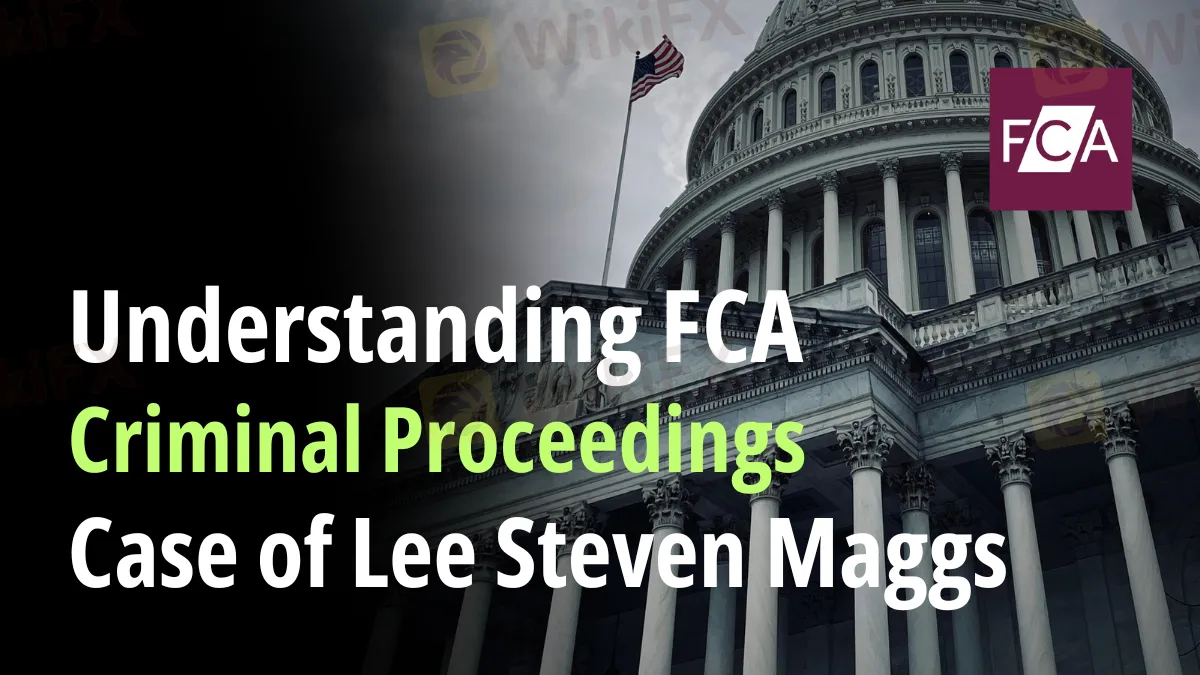简体中文
繁體中文
English
Pусский
日本語
ภาษาไทย
Tiếng Việt
Bahasa Indonesia
Español
हिन्दी
Filippiiniläinen
Français
Deutsch
Português
Türkçe
한국어
العربية
Understanding FCA Criminal Proceedings: Case of Lee Steven Maggs
Abstract:Discover the case against Lee Steven Maggs for fraud in managing Kube Trading. Learn about FCA's actions & implications for investors in this revealing expose.

The Financial Conduct Authority (FCA) has started criminal proceedings against Lee Steven Maggs, a resident of Sittingbourne, Kent. Maggs faced numerous fraud charges due to his management of the illicit investment firm Kube Trading. There are two counts of fraud by false claim and one count of engaging in regulated activity without a license against the person.
According to the FCA, between March 1, 2019, and January 22, 2021, Maggs managed to draw approximately £2.67 million from unwitting investors. These funds were purportedly used for trading contracts for differences in foreign exchange (FX), a sector that requires strict regulatory compliance due to its complex and risky nature.

The claim centers on Maggs' purposeful misrepresentation of trading activity and investment health. The FCA believes that Maggs misrepresented the scheme's operational features and investment management, in addition to hiding large losses that had an immediate effect on members' assets. Investors were successfully led astray by this deceit, which induced a semblance of confidence and promised potential profits on their investments.
Maggs' first judicial appearance in Maidstone Magistrates' judicial on April 23, 2024, exposed his claimed offenses' severity. After hearings, Maidstone Crown Court will hold a plea and trial preparation hearing on May 21, 2024. The next steps will presumably investigate the fraud's details and dishonesty.
Prospective investors and the investing community are strongly encouraged to verify the legitimacy and adherence to regulatory standards of investment schemes as the legal proceedings advance. The temptation of big profits should not distract investors from the possible hazards and legal requirements of investing operations.
The result of this case will be keenly followed, not just for the ramifications for individuals immediately impacted, but also for the larger message it sends about the UK's regulatory environment and the repercussions of breaking the rules. As investors await justice, the financial sector aspires for a result that upholds the ideals of openness and accountability in investing processes.

Disclaimer:
The views in this article only represent the author's personal views, and do not constitute investment advice on this platform. This platform does not guarantee the accuracy, completeness and timeliness of the information in the article, and will not be liable for any loss caused by the use of or reliance on the information in the article.
Read more

New Zealand's FMA Warns Against "YouTube Crypto Investment Scam"
The Financial Markets Authority (FMA), New Zealand's financial regulator, warns individuals against investment scams that use YouTube channels to promote fraudulent cryptocurrency investment firms/websites. The authority explained on its official website how the YouTube cryptocurrency scam works, providing a step-by-step guide to help people recognize and avoid it. Read HOW THE SCAM WORKS and BE SAFE.

How to Know if the Market is Correcting or Reversing?
In trading, distinguishing between a market correction and a market reversal is crucial for making sound decisions. Misjudging one for the other can lead to missed opportunities or significant losses. While both involve price movements, their causes, duration, and implications differ substantially. Understanding these differences can help traders improve their strategies and adapt to market conditions effectively.

RM62k Lost Investment Scam After Joining XRP Community Malaysia on Telegram
A 30-year-old homestay manager from Chendering, Malaysia, fell victim to an online bitcoin investment scam, losing RM62,214.59. According to Kuala Terengganu police chief ACP Azli Mohd Noor, the incident unfolded after the victim joined a Telegram group named “XRP Community Malaysia” on December 19. The group promoted bitcoin investments allegedly powered by Artificial Intelligence (AI).

Victims of Financial Fraud in France Suffer Annual Losses of at Least €500 Million
Financial fraud in France is becoming increasingly diverse, with reports indicating that victims incur annual losses of at least €500 million.
WikiFX Broker
Latest News
RM62k Lost Investment Scam After Joining XRP Community Malaysia on Telegram
Victims of Financial Fraud in France Suffer Annual Losses of at Least €500 Million
What Impact Does Japan’s Positive Output Gap Have on the Yen?
Macro Markets: Is It Worth Your Investment?
Trading is an Endless Journey
SEC Warns on Advance Fee Loan Scams in the Philippines
Russia Turns to Bitcoin for International Trade Amid Sanctions
Rs. 20 Crore Cash, Hawala Network, Income Tax Raid in India
Hong Kong Stablecoins Bill Boosts Crypto Investments
BEWARE! Scammers are not afraid to impersonate the authorities- France’s AMF said
Currency Calculator


